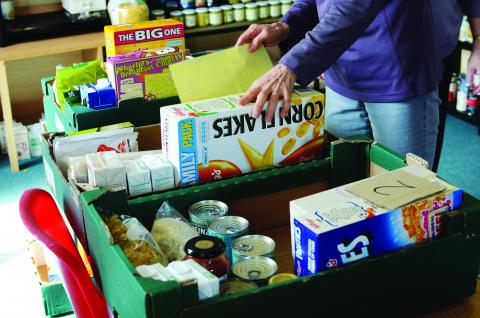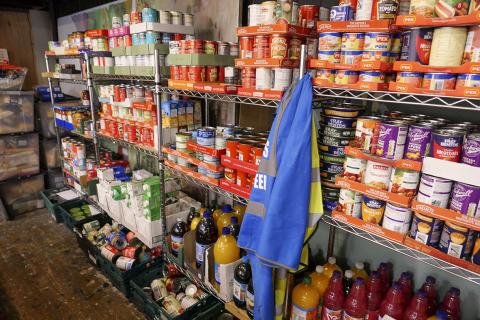Healthy Start needs urgent improvement to tackle food insecurity in the early years
Over a quarter of households with babies and pre-school children are food insecure
New data from The Food Foundation has found families with younger children are at particularly high risk of food insecurity: a worrying 27.3% of households with a child under the age of 4 experienced food insecurity in January 2023. This is significantly higher than households without children where 15.4% were food insecure, and higher than households with only school-aged children (23.0%). While ensuring older children have access to food is of critical importance, policymakers must not forget that earlier intervention is clearly also a necessity.
Source: Food Insecurity Tracker
Food insecurity in the early years can have lifelong consequences
Failing to give children in the UK the best start in life can have lifelong implications for them individually and for wider society. Children’s earliest experiences of food can shape lifelong habits and establish their long-term relationship with food. Furthermore, lack of sufficient nutrition during critical periods in early life may cause irreversible changes to development, and therefore increase risk of chronic disease in later life – a phenomenon known as nutritional programming. Evidence also shows that experiencing household food insecurity during infancy and early childhood is linked to increased risk of obesity. Given that obesity costs the UK approximately £74 billion each year, investing in early years food and nutrition interventions could have huge savings in the long term.
The Healthy Start scheme has the potential to provide a vital nutritional safety net
The Healthy Start scheme is a critical lifeline for young families at risk of food insecurity. The means-tested scheme is available for low-income pregnant women and children under 4 years old who are in receipt of qualifying benefits and provides vitamins and payments which can be used for foods to support basic nutrition, including fruit, veg, pulses, milk and formula milk. This vital nutritional safety net can help ensure that low-income children have access to healthy food in the crucial years before they start school. While the Scheme has great potential to help families access better diets during the cost of living crisis, its impact is currently hampered by several issues that if addressed would greatly strengthen the effectiveness of the scheme in helping those who need it.
Government have missed their target level of uptake of the Healthy Start Scheme
The Department for Health and Social Care (DHSC) committed the NHS BSA, which operates Healthy Start on behalf of the Department, to achieving an uptake level of 75% by March 2023. However, new Government data shows that by March the uptake of the Healthy Start scheme among eligible families was only at 64%, falling well short of the target and far behind uptake levels for Scotland’s equivalent scheme, ‘Best Start Foods’, which was claimed by 88% of eligible parents and carers in 2021-22.
Source: Children's Right2Food Dashboard
Uptake had risen steadily from a low of around 50% during the start of the Covid pandemic to over 60% by August 2021. The digitalisation of Healthy Start last year was an effort by the Government to simplify the application process, replacing paper vouchers with a prepaid card to buy healthy food. While uptake did increase during the transition period from paper vouchers to a pre-paid card, it was likely due to these figures including both those still receiving paper vouchers as well as those who had successfully applied to the digital card scheme. The digital switchover was plagued by technical problems and recipients already on the scheme were required to reapply for the scheme.
It's clear that significant improvements are needed to tackle the historic low uptake levels of Healthy Start – and now is the time given the huge hardship inflicted on families because of the cost of living. There are various reasons for low uptake but largely it’s due to families simply being unaware of the scheme’s existence or struggling with the application process.
In addition to increasing uptake, there are other important ways the scheme could be strengthened to ensure that it maximally benefits children in need of it.
We are calling on government to:
- Increase uptake by:
- Commiting £5m of funding for a comprehensive communications campaign to improve awareness and uptake of Healthy Start – as recommended in the National Food Strategy.
- Looking into solving technical issues that are preventing them from auto-enrolling eligible families in the Scheme or as a minimum write to all those who are eligible but not currently signed up to inform them of the Scheme.
- Increase the value of the payments: Food prices have risen 18.2% in the past year and yet the value of the Healthy Start payments has not risen at all. Payments should be raised in line with food price inflation and thereafter, the Government should review the value every six months.
- Expand eligibility for the scheme: The Government should expand eligibility to all families on Universal Credit and equivalent benefits, and expand to include children aged 4 whose families are receipt of these benefits.
There are already excellent examples of retailers doing work to increase awareness of the Healthy Start Scheme – including Co-op recently creating an advert for Co-op radio to raise awareness of NHS Healthy Start among their customers, Iceland including advertising of the scheme on their milk bottles and Sainsbury’s adding an extra £2 voucher on top of the scheme for eligible customers. We are encouraging all retailers to play their part in promoting the scheme.
We are calling on retailers to:
- Promote the Healthy Start Scheme to help with raising awareness among eligible customers to increase uptake as part of our Kid’s Food Guarantee.
In light of this clear evidence on the scale of food insecurity affecting our youngest children, we urge Government and Retailers to urgently take these actions to help ensure that children in the UK are not spending their first years of life hungry and undernourished.
See here for the full policy position statement.
Further Information
About Healthy Start
Healthy Start is part of the UK Government’s benefits scheme targeted at families with children under the age of four and pregnant mothers on very low incomes, as well as all pregnant teenagers below 18 years of age. It is meant to provide a critical nutritional safety net for the most nutritionally vulnerable, and comprises two parts: a cash allowance and multivitamin supplements. Eligible families get £4.25 per week per eligible individual (£8.50 for infants under 1) intended for spending on fresh, frozen or tinned fruit and vegetables, pulses and grains, cow's milk or infant formula, as well as free multivitamins for both pregnant and breastfeeding mothers and infants and children under 4.
YouGov survey methodology
All figures, unless otherwise stated, are from YouGov Plc. Total sample size was 10,814 UK adults. Fieldwork was undertaken between 31st January and 3rd February 2023. The survey was carried out online. The figures have been weighted and are representative of all UK adults 18+. The figures presented from the online survey have been analysed independently by The Food Foundation and the London School of Hygiene & Tropical Medicine. Comparison to older figures is from a series of previous surveys conducted with YouGov commissioned by the Food Foundation. Population calculations made by the Food Foundation using 2021 mid-year population estimates (reference).
- We ask the following questions to explore how many households have experienced food insecurity:
- Having smaller meals than usual or skipping meals due to being unable to afford or get access to food
- Being hungry but not eating because due to being unable to afford or get access to food
- Not eating for a whole day due to being unable to afford or get access to food
If they answered yes to any of these three questions, they are classified as food insecure. We ask them if they had experienced this in a) the last month and b) the last 6 months. The questions are based on the United States Department of Agriculture's Food Security Survey module.





